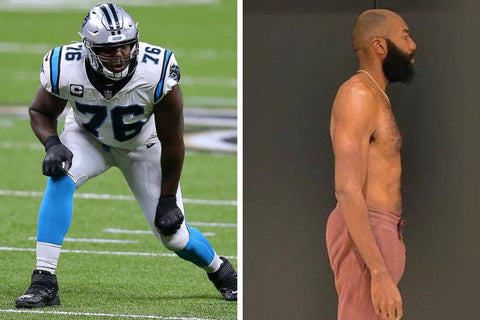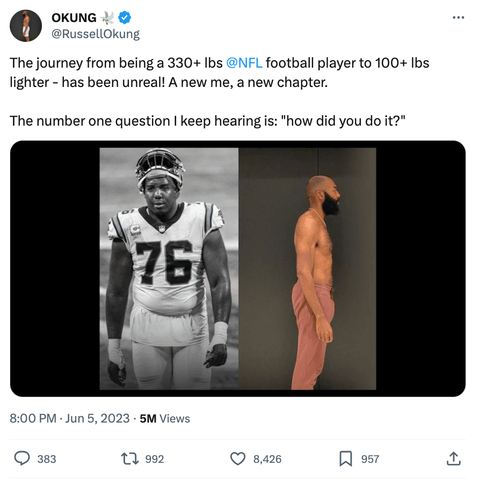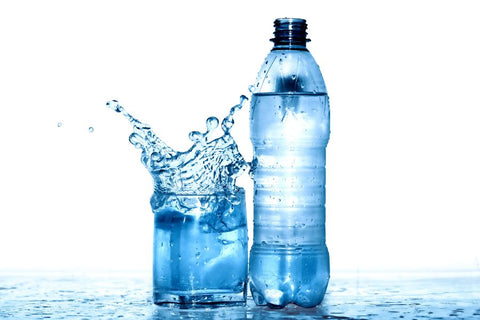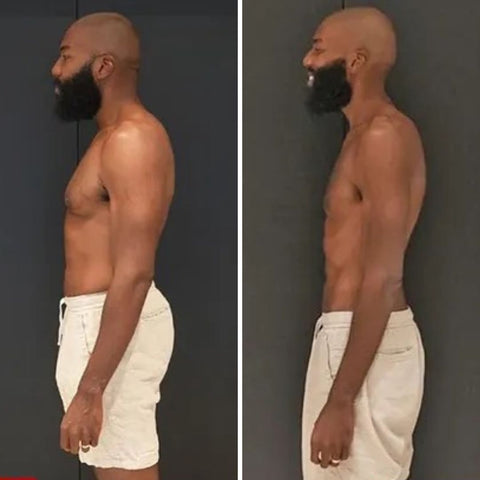Russell Okung is a retired NFL Super Bowl champion who played his career at a massive 6’5”, 330 lbs. The Russell that graced the gridiron and struck fear in opponents’ eyes looks quite different from current-day Russell.
Okung played his last NFL game during the 2020 season before officially retiring on June 6, 2023. Since his time out of the game, Okung has found success as an entrepreneur and, more importantly, transformed his body with fasting.
With the help of water-only fasting, Russell has lost over 100 lbs from his playing weight. In this article, we will explore Russell’s success and determine if water fasting is the best method to lose weight.
Table of Contents:
- Super Bowl Champ
- The 40-Day Water Fast
- Breaking A Water Fast
- Water Fasting: Is It Safe and Effective?
- Benefits/Cons of Water Fasting
- FAQs

Super Bowl Champ: Russell Okung
Russell Okung was a two-time college All-American at Oklahoma State before moving on to the NFL. Russell was a prototypical dominant offensive lineman with a massive 6’5”, 310 lb frame, making a living protecting the quarterback.
At the 2010 NFL Draft Combine, Okung put up a ridiculous 38 reps on the 225-lb bench press, with a 5.21-second 40-yard dash and a 32.5-inch vertical jump.
Russell’s freak-like measurables and natural talent led to a successful 11-year career, far longer than the average career length of 3.3 years.
His top achievements include being a two-time Pro Bowler and playing an integral part of the Seattle Seahawks 2013 Super Bowl victory. Like many retired NFL players, he realized he needed to change his eating habits and lifestyle to live a long, healthy, pain-free life.
Russell Okung’s 40-Day Water Fast
Russell’s remarkable weight loss and body transformation caught the nation’s attention when he posted his success on X (formerly Twitter).
On June 5, 2023, Russell tweeted:
“The journey from being a 330+ lbs NFL player to 100 + lbs lighter – has been unreal! A new me, a new chapter. The number one question I keep hearing is: “how did you do it?”
Answer: I fasted for 40 days with nothing but water. Yes, you read that right!”

Russell Okung’s Take on Water Fasting
Russell continued to expand how the benefits aren’t limited to weight loss. “Fasting isn’t just about weight loss. It’s about regeneration, healing, & self-discovery. In quieting my physical hunger, I unlocked mental clarity and spiritual revelation. A total reset.” 1
Russell has made several posts since the original tweet, reiterating that consuming nothing but water transformed his body. While the 100 lbs weight loss is the heart of the topic, it’s not the only alleged benefit of water-fasting.
Nearly all former NFL players deal with some type of physical pain or ailment daily, with many trying extreme options in search of relief. Water-only fasting has been the solution to weight loss and reducing pain for Okung, but what does the research say?
Studies have shown that prolonged fasting is an intense physiological stimulus that can trigger hormonal changes, including an increase in serotonin. Elevated serotonin levels can help to elevate mood and reduce pain sensitivity.
In addition to serotonin, studies have shown that fasting can increase the release of naturally-occurring opioids, such as plasma β-Endorphin.2
The research shows it’s possible that the natural pain relief Russell experienced from water-fasting was more therapeutic than any other treatment he experienced.
“I now fast to trigger clarity and cut through the noise in my mind.3

How Russell Okung Broke His Water Fast
A key part of success for Russell is to make a gradual transition after the 40 days rather than feast on food like your instincts may want.
He believes the best way to start refeeding is with the use of raw vegetables, fruits, and juices. Based on posts from Russell’s X (account (@RussellOkung), he stated that following his 40-day fast of only water, he spent a week consuming juiced raw fruits and vegetables with a low glycemic index.
He also stresses staying hydrated by drinking plenty of water, practicing portion control to avoid overeating, and saving heavier foods for the end of the transition. Many people struggle with regaining lost weight after breaking a fast, so these tips are essential for overall health and avoiding weight gain.
Water Fasting: Is It Safe and Effective?
While heavy research supports intermittent fasting and other types of fasting, water-only fasting is on the extreme end of the fasting spectrum. Water-only fasting is a type of fasting in which you can only drink water without consuming food or other liquids.
So, what does science say? Is it safe to fast for 40 days with nothing but water? A study from 2021 titled “Is Water-Only Fasting Safe?” sought to find out just that. In the study, twelve middle-aged men ate zero food for eight days, only drinking mineral water.
After the eight days, the participants had significantly reduced stress, weight loss, changes in body composition, serum glucose concentration, and an increase in ketogenesis, all while maintaining protein balance. The participants had significantly elevated ketone β-hydroxybutyrate (BHB) levels, similar to those on the keto diet, to supply energy to the brain.4
Researchers suggest this could partly be why there is a stress reduction because the BHB ketone plays a role in cell signaling and the treatment of disease. Other studies have shown how fasting and β-hydroxybutyrate can slow the effects of aging and prolong the lifespan of healthy mammals.5
However, the participants also experienced dehydration, which led to water sparring, which is a reduced water content and urine content in the body.
There was also a decrease in levels of sodium, total calcium, and magnesium. Sodium concentration levels were below normal, which qualifies as hyponatremia, and can cause nausea, headache, confusion, and fatigue.
On top of this, users also had significantly elevated uric acid levels, known as hyperuricemia. When uric acid enters cells, it causes oxidative stress, which can lead to several problems, including inflammation, hypertension, insulin resistance, and obesity, among others.
Although there were improvements in stress reduction and weight loss, the negative impact on hydration, sodium, calcium, magnesium, and uric acid may outweigh the benefits.
They concluded that while the participants were safe for eight days, water-fasting for longer should be avoided or done under constant medical care.
Moreover, there are safer ways to practice fasting because water-only fasting started to generate unfavorable side effects after only eight days.
An article titled “Efficacy and safety of prolonged water fasting: a narrative review of human trials,” published in Nutrition Reviews repeated these sentiments. The review concluded that prolonged water fasting for 5-20 days only caused minor weight loss of 2-10%, with approximately two-thirds of the weight lost coming from muscle, while only a third is fat mass. In addition, it causes several side effects, including headaches, insomnia, and hunger.6
Verdict: Although water-only fasting has health benefits, it may not be safe for long-term use. Weight loss was limited, with most weight loss coming from muscle rather than fat. We recommend trying a safer, less intense form of fasting, such as intermittent fasting.

The Pros and Cons of Water Fasting
Although there are benefits of water fasting, there are several cons as well, especially for long-term use. There is a need for more long-term studies involving water-only fasting because there is nothing remotely close to the 40 days that Russell did.
Pros of Water Fasting:
- Reduce stress
- Lose body weight
- Improve mental clarity
- Reduce pain
Cons of Water Fasting:
- Dehydration
- Low blood sugar
- Elevated uric acid (hyperuricemia)
- Low sodium concentration (hyponatremia)
- Reduced calcium and magnesium
- Increased ketogenesis
- Loss of muscle mass
- High risk of gaining weight back quickly
Just based on the lists above, it is pretty clear that the risks outweigh the benefits. A water-only fast could be dangerous over time, and there are much safer weight-loss alternatives. Several types of fasting, each with its own eating schedules, have been proven safe and effective. For more information, check out our article 6 Best Intermittent Fasting Methods and Schedules and Everything You Need To Know About 20/4 Fasting.
Water Fasting FAQs:
These are some of the most common questions related to fasting and Russell Okung’s success.
Did Russel Okung really do a water fast for 40 days?
Yes, according to Russel Okung (via a Tweet on X), he did in fact do a 40 day water fast. Russel stated: “The journey from being a 330+ lbs NFL player to 100+ lbs lighter – has been unreal! A new me, a new chapter. The number one question I keep hearing is: “how did you do it?” Answer: I fasted for 40 days with nothing but water. Yes, you read that right!”
Does fasting really work?
Yes, studies have shown that fasting for periods of 12 hours or longer has several health benefits, including weight loss.
What is dry fasting?
Dry fasting is an extreme version of fasting that involves zero food, liquid, or other form of nutrition. For more information, check out our article What Is A Dry Fast? Pros, Cons, How To Do It, and Tips.
How is intermittent fasting different from water fasting?
Intermittent fasting is the most popular kind of fasting. It involves dividing your eating schedule into windows, typically 16 hours of fasting throughout the day, followed by an 8-hour window to eat. With water fasting, you do not consume food, only water, whereas with intermittent fasting, you can have anything.
Is fasting safe for everyone?
No! It is important to speak with your medical professional before starting a fast because it may not be safe, especially if you have an underlying condition. Some people who should avoid fasting include children under 18, women who are pregnant, breastfeeding, or planning to become pregnant, and people with diabetes.

SUMMARY:
You don’t need to be a scientist to determine that Russell Okung is a physical specimen with some of the best genetics on earth. His dedication to football for over 20 years created a body built to endure more stress than 99% of the population can handle.
His mental fortitude allowed him to push through to succeed at a 40-day water-only fast; however, the average person should not try this. In addition to the 40 days, it took Russell several more weeks of gradual eating for his body to adjust before eating heavy foods.
You must also consider that Russell lost over 100 lbs quickly because he had so much excess weight and a frame to support the weight loss. We also assume that he likely was under the close watch of a healthcare or medical professional to ensure he was never in danger.
Russell Okung is among the fittest, most mentally tough athletes in the world, so it doesn’t make sense to try to mimic his routine. We recommend you start slowly with fasting, either with intermittent fasting or short durations of water-only fasting. To learn more about the various types, check out our article 6 Best Intermittent Fasting Methods and Schedules.
Related: Is it Possible to Lose 20lbs in a Month?
References:
-
- Wang, Yiren, and Ruilin Wu. “The Effect of Fasting on Human Metabolism and Psychological Health.” Disease Markers, vol. 2022, January 5 2022, pp. 1–7, www.ncbi.nlm.nih.gov/pmc/articles/PMC8754590/,
- Ogłodek, Ewa, and Wiesław Pilis, Prof. “Is Water-Only Fasting Safe?” Global Advances in Health and Medicine, vol. 10, Jan. 2021, p. 216495612110311,
- Newman, John C., and Eric Verdin. “β-Hydroxybutyrate: A Signaling Metabolite.” Annual Review of Nutrition, vol. 37, no. 1, August 21 2017, pp. 51–76,
- Ezpeleta, Mark, et al. “Efficacy and Safety of Prolonged Water Fasting: A Narrative Review of Human Trials.” Nutrition Reviews, June 27 2023,




































